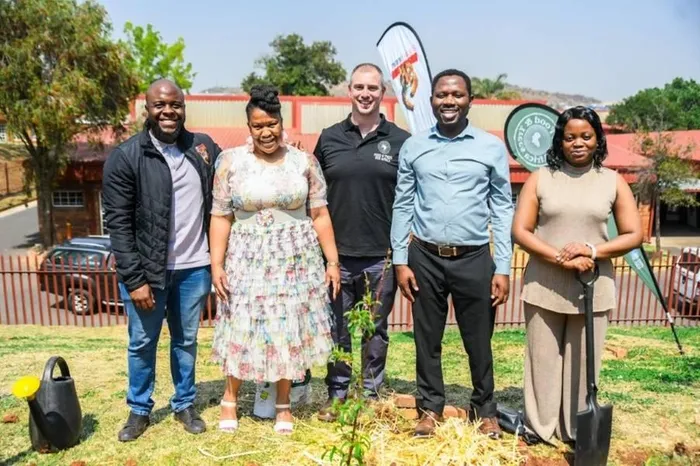Soweto special needs school reaps benefits of hands-on food garden education

Planting fruit trees for food security: Maanda Milubi, director enterprise and supplier development & transformation, Tiger Brands; Mirriam Makhetha, Principal Philip Kushlick School; Chris Wild, executive director, Food & Trees for Africa; Gerson Nethavhani, environmental policy, planning and coordination and climate change at the Gauteng Department of Agriculture, Rural Development and Environment and Lusani Netshipise from GDARDE.
Image: Supplied
Learners at the Philip Kushlick School in Diepkloof, Soweto, are growing more than just vegetables. Through the EduPlant programme, a national school food security and nutrition initiative, learners with special needs are developing practical skills, improving their nutrition, and building confidence through a thriving food garden on campus.
EduPlant is run by Food & Trees for Africa (FTA) and has reached more than 1 200 schools across South Africa since 2019. The programme provides a mix of theoretical training and hands-on workshops to help schools establish and maintain their own food gardens, often becoming vital contributors to school nutrition programmes, community food support, and even small-scale income generation.
At Philip Kushlick School, the programme’s inclusive approach is particularly meaningful. The school caters to learners with special educational needs, and the food garden has become a core part of their learning and development.
“The implementation of the EduPlant programme at Philip Kushlick School is a powerful example of how a school food garden can go beyond education to directly improve the lives and future prospects of its students and the broader community. The tangible improvements in the garden and harvest impact positively on the growth and development of our often marginalised and differently abled learners,” says Chris Wild, executive director of Food & Trees for Africa.
The school’s food garden was a finalist in the EduPlant competition in 2020, and has continued to grow as a learning hub for both junior and senior learners. For younger students, the garden plays a therapeutic role, with exercises in sand and water therapy and plant texture exploration aimed at developing tactile sensitivity. After time in the garden, learners often translate their experience into clay modelling activities, strengthening memory and motor coordination.
Older learners, meanwhile, benefit from lessons in sustainability, environmental awareness, and food production. Their work in the garden supports the agroecology pre-vocational subject offered at the school, creating pathways to potential careers in agriculture and related fields.
Parents are also encouraged to reinforce the lessons at home, with some families starting their own gardens based on the knowledge their children bring back.
“Working in a school garden provides a nurturing, hands-on environment that helps under-resourced children find a sense of purpose and peace, cultivating not just plants, but also resilience and confidence. Our programme is SACE accredited so educators are supported in integrating the knowledge, practically,” says Wild.
EduPlant facilitators train educators and learners in topics such as Permaculture Principles, Garden Design, Soil Testing, and Seed Bed Preparation. Each participating school is provided with the tools and materials needed to establish gardens – including spades, rakes, watering cans, seeds, seedlings and compost.
Tiger Brands has supported the programme since 2019. During a recent visit to the school, senior representatives from Tiger Brands, FTA, and the Gauteng Department of Agriculture, Rural Development and Environment joined the school’s leadership to see the garden’s progress.
“As a leading force in South Africa’s food sector, we carry a profound responsibility to stand alongside vulnerable communities who face the daily struggle of food insecurity. Good nutrition is not a privilege; it is the foundation for dignity, growth, and opportunity. Through the EduPlant programme, with its focus on building self-sustaining communities, we are not only addressing immediate hunger but helping to restore ho